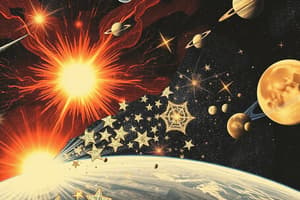Podcast
Questions and Answers
What is the estimated age of the universe according to the Big Bang Theory?
What is the estimated age of the universe according to the Big Bang Theory?
- 5 billion years
- 10 billion years
- 13.8 billion years (correct)
- 14.5 billion years
Which of the following planets has the highest escape velocity?
Which of the following planets has the highest escape velocity?
- Mars
- Venus (correct)
- Jupiter
- Earth
What is the primary component of Venus's atmosphere?
What is the primary component of Venus's atmosphere?
- Nitrogen
- Argon
- Carbon Dioxide (correct)
- Oxygen
Which planet is most similar in size and composition to Earth?
Which planet is most similar in size and composition to Earth?
Which of these planets has the longest orbital period around the Sun?
Which of these planets has the longest orbital period around the Sun?
What is the density of Mars in kg/m3?
What is the density of Mars in kg/m3?
Which planet has an average distance from the Sun of 149.6 million kilometers?
Which planet has an average distance from the Sun of 149.6 million kilometers?
What is the length of a day on Venus in hours?
What is the length of a day on Venus in hours?
Flashcards are hidden until you start studying
Study Notes
Origin of the Universe
- The Big Bang Theory is the predominant model for the universe's origin, proposing that it began 13.8 billion years ago from a small, dense, and hot mass.
- This theory explains the expansion and evolution of the universe over billions of years.
Comparison of Terrestrial Planets
-
Venus
- Mass: 4.87 x 10^24 kg
- Diameter: 12,104 km
- Density: 5,243 kg/m³
- Gravity: 8.9 m/s²
- Escape Velocity: 10.4 km/s
- Surface Pressure: 92 atm, primarily composed of 96% CO₂
- Distance from the Sun: 108.2 million km
- Orbital Period: 224.7 days
- Orbital Velocity: 35 km/s
- Length of Day: 5,832 hours
-
Earth
- Mass: 5.97 x 10^24 kg
- Diameter: 12,742 km
- Density: 5,514 kg/m³
- Gravity: 9.8 m/s²
- Escape Velocity: 11.2 km/s
- Surface Pressure: 1 atm, with 21% O₂ and 77% N
- Distance from the Sun: 149.6 million km
- Orbital Period: 365.3 days
- Orbital Velocity: 29.8 km/s
- Length of Day: 24 hours
-
Mars
- Mass: 0.639 x 10^24 kg
- Diameter: 6,779 km
- Density: 3,933 kg/m³
- Gravity: 3.7 m/s²
- Escape Velocity: 5 km/s
- Surface Pressure: 0.01 atm, with 95% CO₂ and 2.7% N
- Distance from the Sun: 227.9 million km
- Orbital Period: 687 days
- Orbital Velocity: 24.1 km/s
- Length of Day: 25 hours
General Characteristics of Terrestrial Planets
- Venus, Earth, and Mars are classified as inner terrestrial or "rocky" planets, reflecting similarities in composition and density.
- Venus is often referred to as Earth's twin due to its comparable size and mass.
Studying That Suits You
Use AI to generate personalized quizzes and flashcards to suit your learning preferences.




